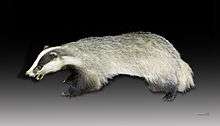իշղար
Armenian

Etymology
Usually considered of unknown origin.[1][2] But compare Persian اشغار (ašğār, “badger”),[3] اشغر (ušğur, “porcupine; badger”),[4] اشغور (ašğūr, ušğūr, “badger”),[5] شغار (šağār, “badger, brock, kind of stinking weasel; urchin, hedgehog”),[6][7], شغر (šuğr, šuğur, “hedgehog; badger”),[8] شغور (šuğūr, “badger; jackal”)[9]. Further compare Ossetian зыгъа́рӕг (zyǧáræg, “badger”), from зыгъа́р (zyǧár, “having a white spot on the forehead (of animals)”), to which are supposedly related Ossetian ӕсгӕ́р (æsgǽr, “having a white stripe on the neck (of animals)”) and Burushaski iškark (“yellow”).[10] See also Old Armenian ճագար (čagar).
Pronunciation
- (Eastern Armenian, standard) IPA(key): [iʃˈʁɑɾ]
Usage notes
Not attested in Old or Middle Armenian texts or in modern dialects. Considered a modern literary coinage.[2] Included in dictionaries as a modern word starting from Norayr.[11][12][13][14]
Declension
| singular | plural | |||
|---|---|---|---|---|
| nominative | իշղար (išłar) | իշղարներ (išłarner) | ||
| dative | իշղարի (išłari) | իշղարների (išłarneri) | ||
| ablative | իշղարից (išłaricʿ) | իշղարներից (išłarnericʿ) | ||
| instrumental | իշղարով (išłarov) | իշղարներով (išłarnerov) | ||
| locative | — | — | ||
| definite forms | ||||
| nominative | իշղարը/իշղարն (išłarə/išłarn) | իշղարները/իշղարներն (išłarnerə/išłarnern) | ||
| dative | իշղարին (išłarin) | իշղարներին (išłarnerin) | ||
| 1st person possessive forms (my) | ||||
| nominative | իշղարս (išłars) | իշղարներս (išłarners) | ||
| dative | իշղարիս (išłaris) | իշղարներիս (išłarneris) | ||
| ablative | իշղարիցս (išłaricʿs) | իշղարներիցս (išłarnericʿs) | ||
| instrumental | իշղարովս (išłarovs) | իշղարներովս (išłarnerovs) | ||
| locative | — | — | ||
| 2nd person possessive forms (your) | ||||
| nominative | իշղարդ (išłard) | իշղարներդ (išłarnerd) | ||
| dative | իշղարիդ (išłarid) | իշղարներիդ (išłarnerid) | ||
| ablative | իշղարիցդ (išłaricʿd) | իշղարներիցդ (išłarnericʿd) | ||
| instrumental | իշղարովդ (išłarovd) | իշղարներովդ (išłarnerovd) | ||
| locative | — | — | ||
References
- Ačaṙean, Hračʿeay (1973), “իշղար”, in Hayerēn armatakan baṙaran [Dictionary of Armenian Root Words] (in Armenian), volume II, 2nd edition, reprint of the original 1926–1935 seven-volume edition, Yerevan: University Press, page 247b
- J̌ahukyan, Geworg (2010), “իշղար”, in Vahan Sargsyan, editor, Hayeren stugabanakan baṙaran [Armenian Etymological Dictionary] (in Armenian), Yerevan: Asoghik, page 286
- Steingass, Francis Joseph (1892), “اشغار”, in A Comprehensive Persian–English dictionary, London: Routledge & K. Paul, page 65a
- Steingass, Francis Joseph (1892), “اشغر”, in A Comprehensive Persian–English dictionary, London: Routledge & K. Paul, page 65a
- Steingass, Francis Joseph (1892), “اشغور”, in A Comprehensive Persian–English dictionary, London: Routledge & K. Paul, page 65a
- Steingass, Francis Joseph (1892), “شغار”, in A Comprehensive Persian–English dictionary, London: Routledge & K. Paul, page 747b
- Nalbandyan, G. M. (1987), “شغار”, in Parskeren-hayeren baṙaran [Persian–Armenian Dictionary], Yerevan: Luys, page 375a
- Steingass, Francis Joseph (1892), “شغر”, in A Comprehensive Persian–English dictionary, London: Routledge & K. Paul, page 747b
- Steingass, Francis Joseph (1892), “شغور”, in A Comprehensive Persian–English dictionary, London: Routledge & K. Paul, page 748a
- Abajev, V. I. (1989) Istoriko-etimologičeskij slovarʹ osetinskovo jazyka [Historical-Etymological Dictionary of the Ossetian Language] (in Russian), volume IV, Moscow, Leningrad: USSR Academy of Sciences, pages 318–319
- Norayr N. Biwzandacʿi (1884), “blaireau”, in Baṙagirkʿ i gałłierēn lezuē i hayerēn [Dictionary from the French Language into Armenian], Constantinople: A. H. Boyajian Press, page 151b
- Yakobean, V. Y. (1892), “badger”, in Z. Torossian, editor, Baṙaran anglierēnē hayerēn [A Dictionary English Armenian], Constantinople: Servitchen, page 39b
- Koylawean (Goilaw), Awetikʿ (1889), “Dachs”, in Baṙagirkʿ germanerēn-hayerēn [Deutsch-armenisches Wörterbuch], Vienna: Mechitharisten-Buchdruckerei, page 400a
- Gabamačean, Simon (1910), “իշղար”, in Nor Baṙagirkʿ Hayerēn Lezui [New Dictionary of the Armenian Language] (in Armenian), 2nd edition, Constantinople: R. Sakayan press, page 559a